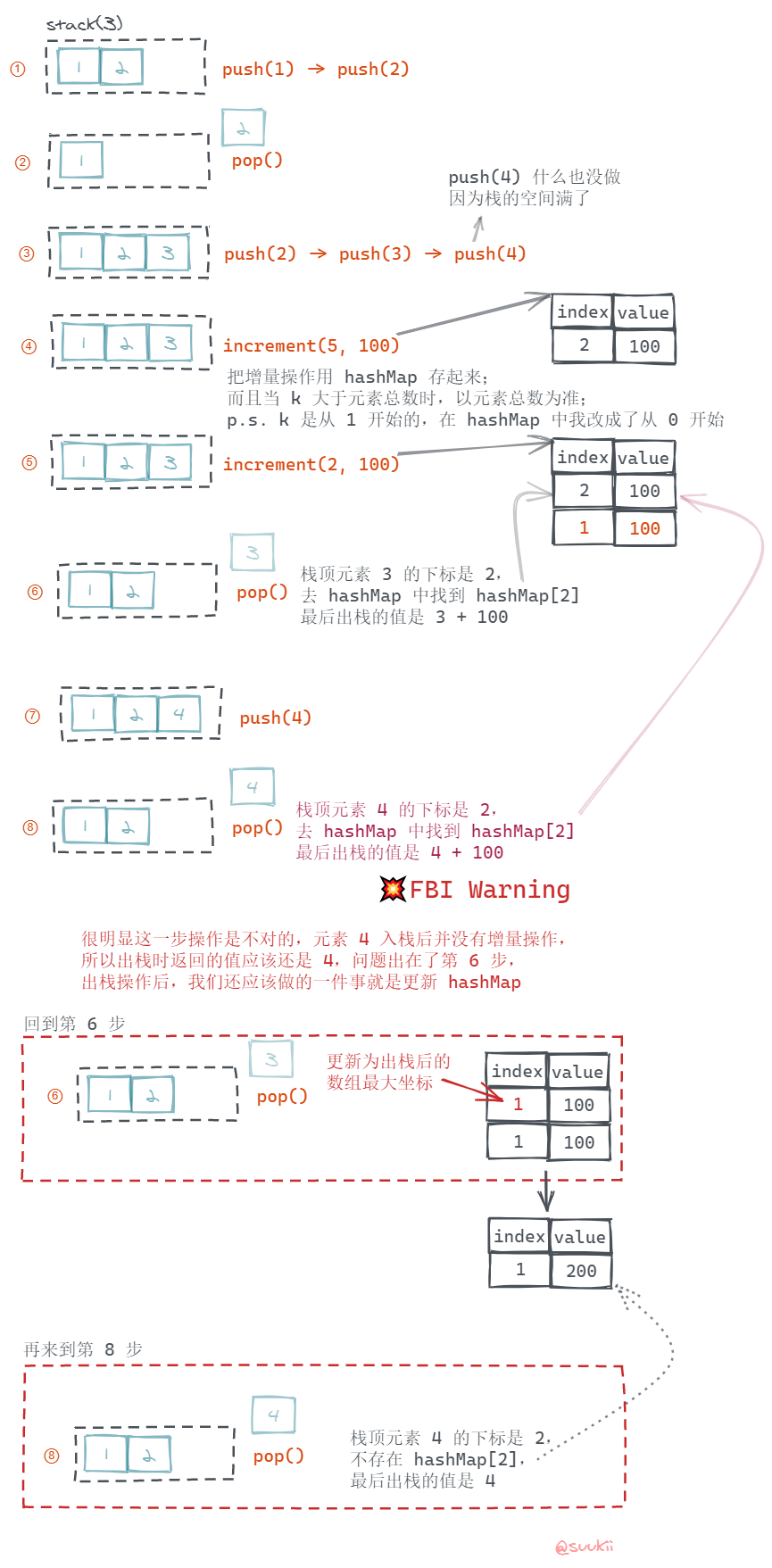https://leetcode-cn.com/problems/design-a-stack-with-increment-operation/
请你设计一个支持下述操作的栈。
实现自定义栈类 CustomStack :
CustomStack(int maxSize):用 maxSize 初始化对象,maxSize 是栈中最多能容纳的元素数量,栈在增长到 maxSize 之后则不支持 push 操作。
void push(int x):如果栈还未增长到 maxSize ,就将 x 添加到栈顶。
int pop():弹出栈顶元素,并返回栈顶的值,或栈为空时返回 -1 。
void inc(int k, int val):栈底的 k 个元素的值都增加 val 。如果栈中元素总数小于 k ,则栈中的所有元素都增加 val 。
示例:
输入:
["CustomStack","push","push","pop","push","push","push","increment","increment","pop","pop","pop","pop"]
[[3],[1],[2],[],[2],[3],[4],[5,100],[2,100],[],[],[],[]]
输出:
[null,null,null,2,null,null,null,null,null,103,202,201,-1]
解释:
CustomStack customStack = new CustomStack(3); // 栈是空的 []
customStack.push(1); // 栈变为 [1]
customStack.push(2); // 栈变为 [1, 2]
customStack.pop(); // 返回 2 --> 返回栈顶值 2,栈变为 [1]
customStack.push(2); // 栈变为 [1, 2]
customStack.push(3); // 栈变为 [1, 2, 3]
customStack.push(4); // 栈仍然是 [1, 2, 3],不能添加其他元素使栈大小变为 4
customStack.increment(5, 100); // 栈变为 [101, 102, 103]
customStack.increment(2, 100); // 栈变为 [201, 202, 103]
customStack.pop(); // 返回 103 --> 返回栈顶值 103,栈变为 [201, 202]
customStack.pop(); // 返回 202 --> 返回栈顶值 202,栈变为 [201]
customStack.pop(); // 返回 201 --> 返回栈顶值 201,栈变为 []
customStack.pop(); // 返回 -1 --> 栈为空,返回 -1
提示:
1 <= maxSize <= 1000
1 <= x <= 1000
1 <= k <= 1000
0 <= val <= 100
每种方法 increment,push 以及 pop 分别最多调用 1000 次
来源:力扣(LeetCode)
链接:https://leetcode-cn.com/problems/design-a-stack-with-increment-operation
著作权归领扣网络所有。商业转载请联系官方授权,非商业转载请注明出处。
使用数组来模拟栈,可以实现时间复杂度 push 和 pop,和 inc,剩下的就跟着题目描述来实现就好了。
- 当栈元素个数等于
maxSize时不允许继续入栈; - 当栈为空时,出栈操作返回 -1;
- 增量操作时,当栈元素多于
k个,将栈底的 k 个元素都加val,栈元素少于k个时将所有元素都加上val。
- 时间复杂度:
push和pop是$O(1)$ ,inc是$O(k)$ 。 - 空间复杂度:$O(maxSize)$。
也可以使用链表来模拟栈,入栈出栈都只操作 head,也能实现时间复杂度 push 和 pop 操作,但 inc 操作的话,由于找到从链表尾端开始的第 k 个元素 (可以用双指针来找) 的时间复杂度是 k 个元素进行增量操作的时间复杂度是
- 时间复杂度:
push和pop是$O(1)$ ,inc是$O(n+k)$ 。 - 空间复杂度:$O(maxSize)$。
JavaScript Code
/**
* @param {number} maxSize
*/
var CustomStack = function (maxSize) {
this.list = [];
this.maxSize = maxSize;
};
/**
* @param {number} x
* @return {void}
*/
CustomStack.prototype.push = function (x) {
if (this.list.length < this.maxSize) {
this.list.push(x);
}
};
/**
* @return {number}
*/
CustomStack.prototype.pop = function () {
const item = this.list.pop();
return item === void 0 ? -1 : item;
};
/**
* @param {number} k
* @param {number} val
* @return {void}
*/
CustomStack.prototype.increment = function (k, val) {
for (let i = 0; i < k && i < this.list.length; i++) {
this.list[i] += val;
}
};
/**
* Your CustomStack object will be instantiated and called as such:
* var obj = new CustomStack(maxSize)
* obj.push(x)
* var param_2 = obj.pop()
* obj.increment(k,val)
*/Python Code
class CustomStack(object):
def __init__(self, maxSize):
"""
:type maxSize: int
"""
self.list = []
self.maxSize = maxSize
def size(self):
return len(self.list)
def push(self, x):
"""
:type x: int
:rtype: None
"""
if self.size() < self.maxSize:
self.list.append(x)
def pop(self):
"""
:rtype: int
"""
return -1 if self.size() == 0 else self.list.pop()
def increment(self, k, val):
"""
:type k: int
:type val: int
:rtype: None
"""
size = k if k < self.size() else self.size()
for i in range(0, size):
self.list[i] += val
# Your CustomStack object will be instantiated and called as such:
# obj = CustomStack(maxSize)
# obj.push(x)
# param_2 = obj.pop()
# obj.increment(k,val)其实我们只在出栈时才关心元素的值,所以在增量操作的时候,可以不用去更新栈内的元素,而是用一个 hashMap 来记录第几个元素需要增加多少。出栈时,检查当前元素的下标是否在 hashMap 中有记录,有的话就加上增量再出栈。这样我们就得到了时间复杂度
- 时间复杂度:
push,pop和inc都是$O(1)$ 。 - 空间复杂度:$O(maxSize)$,模拟栈的数组和哈希表的空间都是
$O(maxSize)$ 。
JavaScript Code
/**
* @param {number} maxSize
*/
var CustomStack = function (maxSize) {
this.list = [];
this.maxSize = maxSize;
this.hashMap = {};
};
/**
* @param {number} key
* @param {number} value
* @return {void}
*/
CustomStack.prototype._setInc = function (key, value) {
if (!(key in this.hashMap)) {
this.hashMap[key] = 0;
}
this.hashMap[key] += value;
};
/**
* @param {number} key
* @return {number}
*/
CustomStack.prototype._getInc = function (key) {
return this.hashMap[key] || 0;
};
/**
* @return {number}
*/
CustomStack.prototype._size = function () {
return this.list.length;
};
/**
* @param {number} x
* @return {void}
*/
CustomStack.prototype.push = function (x) {
if (this._size() < this.maxSize) {
this.list.push(x);
}
};
/**
* @return {number}
*/
CustomStack.prototype.pop = function () {
const top = this._size() - 1;
const inc = this._getInc(top);
let item = this.list.pop();
if (item === void 0) {
return -1;
}
item += inc;
const newTop = top - 1;
this._setInc(newTop, inc);
this.hashMap[top] = 0;
return item;
};
/**
* @param {number} k
* @param {number} val
* @return {void}
*/
CustomStack.prototype.increment = function (k, val) {
const size = this._size();
k = k < size ? k - 1 : size - 1;
this._setInc(k, val);
};
/**
* Your CustomStack object will be instantiated and called as such:
* var obj = new CustomStack(maxSize)
* obj.push(x)
* var param_2 = obj.pop()
* obj.increment(k,val)
*/